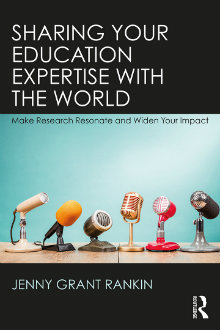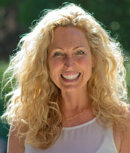How to Be Heard Worldwide from Your Classroom
Practical ways busy teachers can share what they know with the world to help even more kids
By Jenny Grant Rankin, Ph.D.
Education policies often reflect little or no teacher input. News (and thus public perception) about schools is shaped by stakeholders who don’t work in classrooms. Teachers make monumental discoveries every day, but researchers don’t study them because they never hear about them. Teacher preparation programs are often designed by those with little or no classroom teaching experience.
Do any of these facts bother you? If they do, you teachers can change them. You can share your powerful classroom discoveries with the world.
Maybe you’ve found a strategy that calms a “fight or flight” mode student in 30 seconds. Maybe you’ve developed a program that has dyslexic kids reading as proficiently as their peers. Maybe you have an idea that could revolutionize the way classrooms are arranged. Or maybe you like to blog about your journey as a teacher.
Whatever you know, sharing it outside school walls can inform policymakers, journalists, the public, other teachers, researchers, professors …who can use this knowledge to better serve students.
But you’re busy. Very, very busy.
So what are some quick, easy, practical ways you can share what you know with wider audiences? There are many. Here are some, taken from my book Sharing Your Education Expertise with the World.
Ways to Be Heard That Fit a Busy Teacher’s Schedule
► Register with free directories reporters use when finding education experts to book on television and radio or interview for news stories. Education Writers Association (EWA) has 3,000 reporter members, and they use SourceSearch to find experts like you for input. Public Insight Network (PIN) is used extensively by TV stations and networks (like PBS), public radio (including NPR), news organizations (like The Washington Post), and universities (Briggs, 2016).
► Invite a local news station to film one of your special lessons or events. Involve your principal for logistics (e.g., if parent permission isn’t secured in advance, students will have to face forward so their faces are not captured on film). Local, regional, and state media outlets devote 7% of their coverage to education (national media outlets devote only 2%), and 80% of the public gets the majority of its news from local television, which it deems more trustworthy than national sources (Campanella, 2015).
► Did you already write a blog post or article but want more people to know about it? Add #TellEWA to a tweet about it. This immediately lets the Education Writers Association (EWA) know about your post, and EWA will often then share your piece with its 3,000+ journalists in the field, perhaps as an “EWA Story of the Week.” Also share a link to your article or resource through social media with hashtags (e.g., #teaching) that will help others discover your work when they search by that hashtag. (Want to research hashtags? Try Hashtagify.)
► Take that PowerPoint presentation you’re already using to teach your colleagues about something, and present it in an online education conference. You can typically pick any time slot (due to international audiences), present in your pajamas (attendees only see your slides), sound like a genius (no one can tell you’re looking at notes), and save time (the next time someone wants you to present, simply direct them to the recording that was automatically made of your talk).
Click the “eResources” tab here, where my book’s free online resources are housed, and click “List of Conferences” to download a list of 179 education conferences. Look for the ones that list “online” in the “Location” column (you can sort by that column to more easily spot them) and apply to present.
► Submit short answers to publications. Venues like the “Tell Me About” column in ASCD’s Educational Leadership magazine, Quora, and Wikipedia accept short answers to education topics and are seen by many. For example, Wikipedia ranks as the sixth most widely used website in the world, and users view 10 billion pages within merely the English version of the site every month (Simonite, 2013). Some educators deride the site, whereas you could instead add a sentence or two to remove inaccuracies and improve users’ understanding of a topic. Classroom Q&A by Larry Ferlazzo (~70k Twitter followers) is published at EdWeek Teacher (~270k followers) and asks new questions every week that any educator can respond to.
► Join a Twitter chat. This is a conversation between Twitter users who follow and include the same hashtag (e.g., #edchat) in tweets to participate in a single discussion. Since tweets are short, you can quickly share ideas. When I guest moderated an @Edutopia Twitter chat, over 4,600 people participated, meaning our ideas were seen by thousands, and the Edutopia team picked insightful contributors (e.g., teachers who tweeted during the chat) to invite to write guest articles for their site.
► Get interviewed. Education radio shows, such as teacher (and popular public voice) Larry Ferlazzo’s Classroom Q&A podcast on BAM! Education Radio, regularly feature teachers as guests. Since you are answering questions on the spot and within your area of expertise, there is no preparation needed, and such shows are often only 15 minutes in length. Click the “eResources” tab here to download “List of Broadcasting Opportunities” listing details on 109 podcasts, radio shows, and other opportunities to be interviewed. Approach those related to education.
► Write a book …without the usual length. If you’re anxious to be an author but don’t have time for a full-length book, consider writing a short book, such as for ASCD’s Arias series of 10,000-word books (equivalent to just 2 chapters in length). Search around and you’ll find other education publishers offering shorter formats (100 pp. or less). OR, clean up an academic paper you are passionate about (one you wrote in a teacher PD or masters course but never published) and submit it as a chapter in an academic book (e.g., visit IGI Global and change the “Display” field to “Call for Book Chapters”).
When either your short book or book (with your chapter) is published, you’ll be a published author. You’re building your cred and can likely set up an Amazon author page (among others), and get to enjoy other perks of sharing your ideas via publishing.
► Write a book review for professional development materials you’re already reading. Words flow easily when writing your reaction to something, and reviews allow you to add your insight about publications your peers consume. MiddleWeb and edCircuit are well-respected, widely read venues for reviews related specifically to education.
► Speak to policymakers. “When education decisions are made without teachers at the table, students suffer the consequences” (Coggins, 2017, p. 6). Though of critical importance, teacher voice is particularly underrepresented when legislation is made (Gozali, Claassen Thrush, Soto-Peña, Whang, & Luschei, 2017). State and local policies and spending have greater bearing on classrooms than those at the federal level. Fortunately, local policymakers are typically easy to get a hold of. Devote a few minutes to reach one of your elected officials by phone or email.
Put It on Your Resume
As you share your discoveries and ideas with the world, put your endeavors (interviews, presentations, etc.) on your resume and share them with colleagues. These accomplishments tell others you are open to sharing on the world stage. This brings more opportunities your way (e.g., now the Superintendent wants you to present at a professional development day), which you can accept or decline as your time allows.
Every time you ‘step out’ in the field and share in some way, you increase the likelihood of more great things happening. In this case, it’s more chances to share your work and impact more student lives” (Rankin, 2018, p. 11).
Have other ideas about building your educator presence in the world? Share in the comments!
________________________________________________

Jenny Rankin previously served as a K-12 teacher (winning Teacher of the Year), school administrator, district administrator, and chief education & research officer and has been honored by the U.S. White House for her contributions to education. Read a review of her book First Aid for Teacher Burnout here at MiddleWeb. She can be reached at DrJRankin@gmail.com and www.JennyRankin.com.





































Oh Dr. R! You always have such good advice for educators. I love how you affirm us as professionals and people. Truly, you are amazing. I have your newest book on my beside table and hope to crack it open this weekend! THANK YOU FOR ALL YOU DO FOR ALL OF US!